Space Is Terrifying
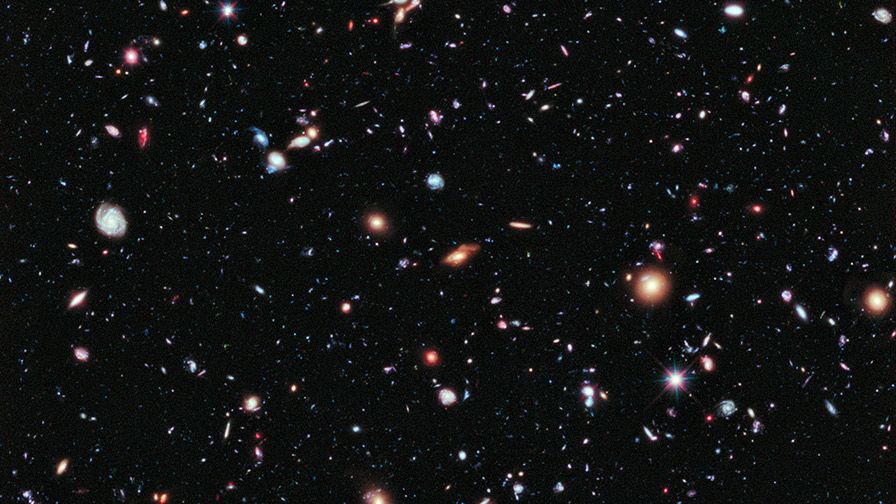
Space is fascinating, mysterious, and filled with wonder. But it can also provoke an unshakeable feeling of dread and existential terror. The void is immense and uncaring, filled with cosmic horrors that boggle the mind.
Being so small within the cosmos can leave one feeling insignificant, irrelevant, and utterly alone. Yet we continue exploring, peering into the abyss, and discovering more strange and unsettling truths about our universe and ourselves.
This is a journey into the side of space that keeps us awake at night, the dark thoughts that lurk beyond the beauty of the cosmos.
The Void
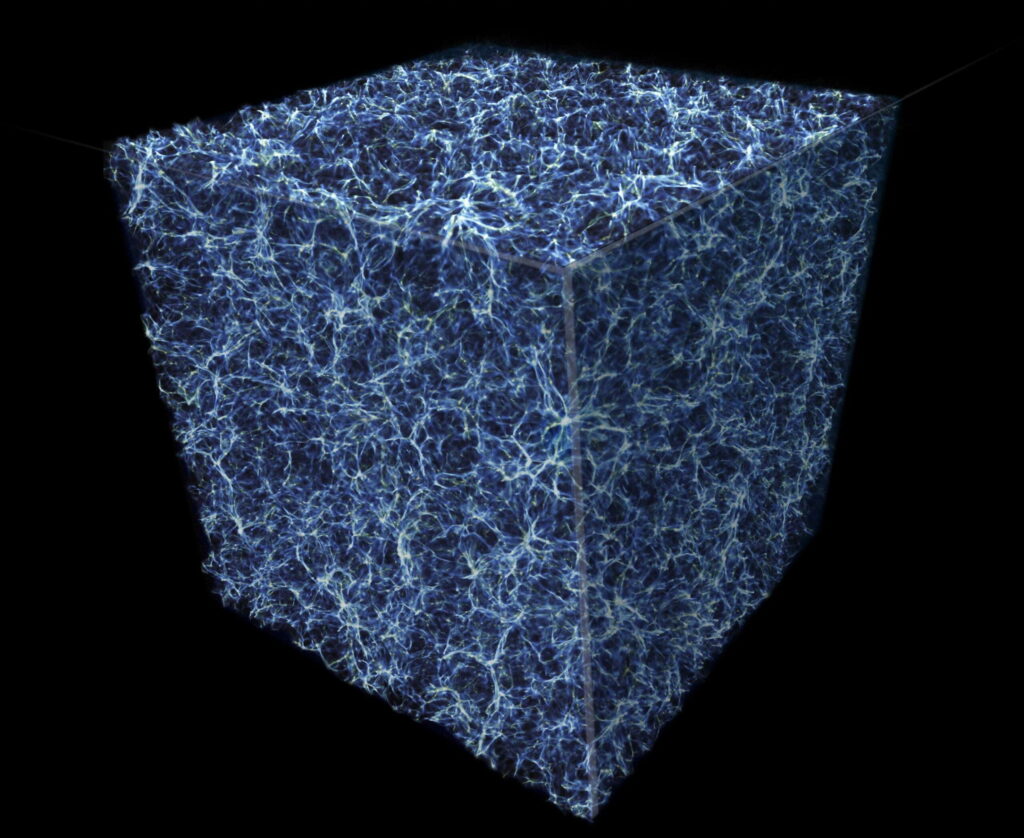
Image: Matter distribution in a cubic section of the universe. The blue fiber structures represent the matter (primarily dark matter), and the empty regions in between represent the cosmic voids. via Wikipedia.
The mere thought of staring into the infinite darkness of space is enough to send chills down the spine. The void seems alive, waiting to swallow everything and anything within reach. The most terrifying aspect of space is simply the absence of anything - no light, sound, or life.
Venture far enough from our tiny planet, and you encounter a ceaseless night devoid of warmth or comfort. The sunlight that nourishes life on Earth dissipates within a few astronomical units. Beyond that lies perfect, frigid nothingness.
An astronaut untethered from his ship would continue to drift helplessly through this formless void for all eternity. With no gravitational anchor and no friction, he could wander amid the stars for billions of years without ever reaching a destination. The vacuum would slowly leech the heat and air from his suit until he freezes into an empty skin lingering in the womb of the dark.
The idea of such eternal, motionless isolation is enough to drive one mad. Space offers no escape, no rescue, no ends to its nothingness. The astronaut becomes a speck of dust suspended in a bottle of emptiness, with no hope of ever touching anything real again.
The void waits, infinite and indifferent, as one tiny conscious being succumbs to the cold silence.
Monsters in the Darkness

The vast silence of space seems to hide unspeakable terrors just beyond our sight. The darkness contains unknown monsters that could instantly snuff out human civilization.
Consider the immense power of asteroids, many large enough to cause a global catastrophe like the one that wiped out the dinosaurs. We know they're out there, invisible in space between planets, yet we are helpless to stop one on a collision course with Earth. They lurk in the blackness, cosmic billiards balls ready to strike at any moment.
Then there are the possibilities beyond our imagination. What alien horrors wander the unlit gulfs between the stars? Are there creatures that feed on light and warmth, drawn to civilizations like moths to a flame? Space is so immense that we've barely explored our backyard; the vast and ancient parts of the cosmos likely contain things we couldn't even conceive of in our worst nightmares.
If unfathomable aliens exist, they have had billions of years to advance technologically, genetically engineer themselves, and plot in the dark. They may be watching us, monsters hidden within the silence, scheming incomprehensible horrors for an insignificant blue world.
The very act of looking out at the cosmos may attract their gaze. Staring into the void, we peer into the abyss that stares also into us. Terrible jaws may unhinge in the black light-years away, drooling at the prospect of devouring such tiny illuminated morsels floating defenseless in the ocean of night.
The Smallness of Humanity
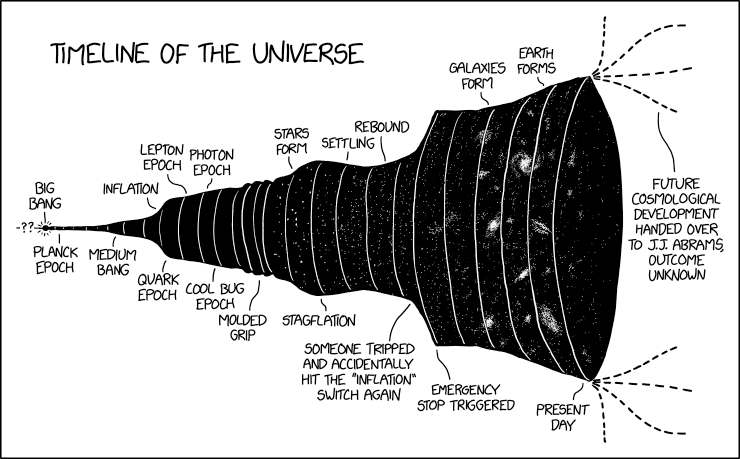
Read: Timeline of the universe.
When we gaze at the vastness of the cosmos, our humanity looks small and fragile by comparison. We are tiny conscious flecks floating in an ocean of immense black nothingness.
The vast gulf between the scales of our lives and the universe is profoundly unsettling. Our recorded history, everything we've built and accomplished, is little more than a blip against deep time and the immense gulfs between stars. The lifespan of a single human being is less than the time it takes light from our closest neighboring star to reach Earth.
When viewed from a cosmic scale, what we consider enduring monuments - the pyramids, the Great Wall of China - appear as ephemeral as mayfly wings. Our greatest languages will decay into gibberish, and all traces of human civilization will inevitably vanish into obscurity, forgotten by an uncaring universe within mere fractions of its lifespan.
The atoms that compose our bodies were formed in the crucible of long-dead stars and will one day disperse into space as those same stars die violent deaths. We will be torn and scattered into cosmic dust with everything we loved and created.
There is sobering violence in this certainty.
The cosmos reduces us to sparks that flicker briefly against the gloom before guttering into cold irrelevance. No one will be left to remember us, no trace that we ever existed.
Our entire history will amount to little more than a changed configuration of particles, soon to be wrenched apart and mixed with the remnants of a trillion other blossomings and extinctions.
This sense of cosmic smallness and impermanence can stir existential dread within the human heart. We are tiny, fleeting, and burn so briefly against the dark.
Space reminds us that for all our hope and meaning, we remain forgotten dust upon the cold winds of time.
Planets beyond imagination
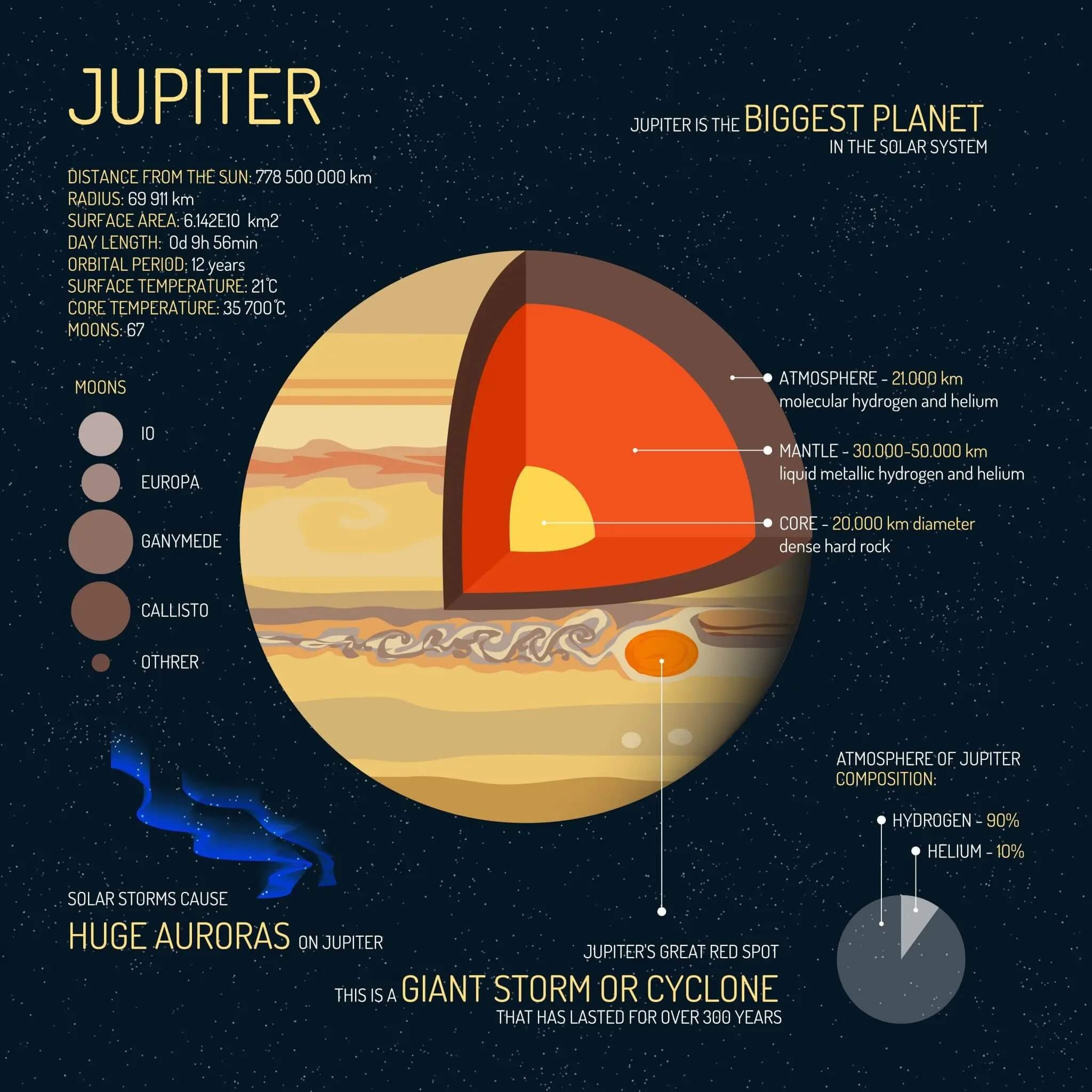
Note: I know Jupiter isn't beyond one's imagination. But it's still one scary planet.
The alien worlds discovered beyond our solar system challenge and reshape our fundamental notions about what a planet means. Many of these strange environments seem ripped from the pages of science fiction, revealing aspects of reality our Earthbound minds could never have conjured on our own.
Some exoplanets orbit so close to their parent stars that their very surfaces likely resemble hellscapes, with molten metals pooled on the dayside and high-speed winds carrying iron droplets between hemispheres. On tidally locked 'dark' worlds that permanently show the same face to their stars, planetwide storms may howl ceaselessly in the atmospheric limbo between perpetual day and night.
Other exotic planets may feature clouds of diamond rain, torrential downpours of molten glass, or dramatic seasons when an entire ocean boils away into vapor before condensing out of the atmosphere again. Alien biospheres could thrive on such worlds through bizarre chemistries unfathomable to human scientists.
The more we learn, the more our imaginations fall short.
Worlds have been discovered where the atmospheric pressure at the surface exceeds all known materials, with talents like iron compressed into exotic allotropes. Some gas giants likely contain rocky 'ocean planets' with entire civilizations that could rise and fall unnoticed within their massive atmospheres.
Our visions of what alien life and worlds might look like have barely scratched the surface of cosmic possibilities. The sheer variety of environments beyond our solar system challenges our preconceptions of what constitutes habitable.
With each discovery, we realize our provincialism anew. The multiverse likely contains Earth analogs and realms of physics and being we cannot begin to comprehend, stranger than any fiction our earthly minds could invent.
Venturing beyond familiar skies and gardens has revealed how vast and wild the cosmos truly is, filled with wonders and terrors beyond our imagination.
The more we learn, the more we realize how little we truly understand - and how far we have yet to travel before we can call those alien shores our home.
Ghosts in the Silence
The stillness of space unnerves us on a primal level. The lack of sound strips away our defenses, leaving us vulnerable to dark thoughts from the void.
Silence weighs heavily in our ears once our machines fall quiet. We evolved on a vibrant world teaming with noise - the rush of wind, the songs of birds, the crash of waves. Our very biology expects a constant roar of sensory input. The total hush of space presses in and feels violent.
We may imagine ghosts whispering at the edge of hearing in that perfect stillness. The vacuum becomes a dark hollow ringing with memories of extinct worlds and vanished civilizations. Countless voices cry out from the past, begging to be heard across dead stellar systems.
Astronauts have reported strange sensations of being watched in the silence of space. They describe hearing unexplained sounds and subliminal whispers that seem to come from within their minds—the voices of the void.
Scientists dismiss these experiences, but there remains something uncanny about space's perfect muteness. It strips time down to an endless frozen now, making us susceptible to echoes from beyond the grave. The voices of the dead seem clearer in this place untouched by wind or rain, this mausoleum of eternity.
In the vast cathedral of space, even our thoughts ring hollow. Silence devours sound and meaning, reducing everything to stillborn whispers swallowed by the void.
What secrets lurk in those unheard whispers? Tales of civilizations wiped from existence before humans learned to walk upright, stories that could illuminate our doom? Or simply the cries of souls marooned in this soundless waste, ghosts adrift in a place that cannot hear them?
In the end, the silence remains absolute. The vacuum swallows all sound and erases all meaning.
Any voices that manage to reach us across the gulf are indistinguishable from the hollow hiss of static, ghosts crying out from the beyond we cannot understand. Their words sound like nonsense, lost in the muteness before ever reaching our ears.
The End of Everything

Some of the most terrifying truths about space concern the inevitable ends of everything we know and love. The cosmos constantly evolves, transforming in ways that spell doom for our little corner of the universe.
We exist in the blink of an eye during the middle stages of the universe's lifespan. But all stories contain an ending, and our cosmic narrative will come to a close when the stars die out.
We can already see the sun's death approaching in about five billion years. Our nearest star will swell into a red giant, engulfing the inner planets and vaporizing any life on Earth.
The sun will burn brightly for a time before collapsing in on itself, leaving behind a smoldering white dwarf too dim to sustain life. Our beautiful golden star, the giver of life, will die violently - and we can do nothing to stop it.
On a grander scale, astrophysicists believe the very expansion of the universe will one day rip apart all matter and energy, leaving nothing but a featureless, radiation-soaked waste. Stars themselves will fade as their fuel is exhausted, sinking into an eternal night of space. Black holes will evaporate, and even the universe's atoms and particles may dissolve.
This "heat death" represents an inescapable end to everything - all light, all life, all memory or meaning. The cosmos will fade into a formless, motionless void of absolute nothingness. Every period from the Big Bang to the present day will be undone, leaving no trace that anything ever existed.
There is a cosmic irony in this certainty: the universe that birthed consciousness will ultimately erase that very consciousness, reducing everything we are and know to formless nonexistence. Our thoughts, histories, achievements, and even the raw sensation of existence will all be wiped from reality.
Viewed from this eternal perspective, human life appears not just small and fragile but utterly futile. Our dreams and desires are doomed to vanish like smoke, forgotten by a universe destined to forget itself. Ultimately, even atoms and stars will be lost to the mute abyss of an empty future without end.
Space contains terrible truths about the fallibility of existence itself. But perhaps the most frightening truth is that we cannot look away.
The Expanding Universe
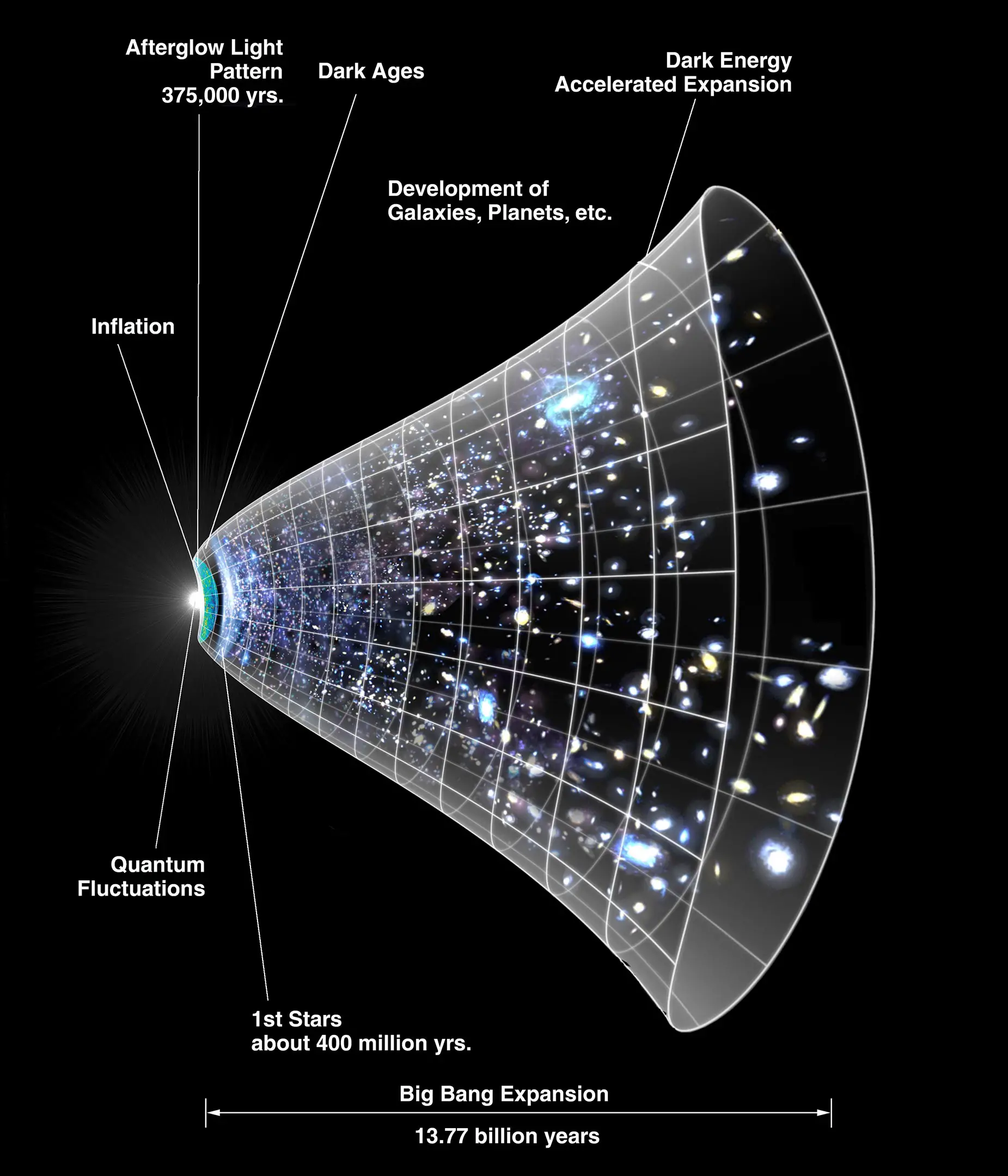
The universe is not static - it constantly expands, evolves, and grows in complexity. This growth is both wondrous and unsettling.
The universe began in extreme simplicity - a primordial fireball of energy that cooled and condensed over billions of years into the elements and atoms that now comprise all of matter and life. But as it expanded and cooled, structures within the universe became more organized and complex.
Galaxies, stars, and planets self-organized from the initial chaos, creating nested hierarchical systems that allow for ever greater complexity. The elements forged in the hearts of stars made possible the chemistry of carbon and, ultimately, the rise of life.
Living systems further increased the complex arrangement of matter and energy within the universe, giving rise to minds that could contemplate the very cosmos that birthed them. Human civilization and technology represent another layer of complexity and organization, manipulating matter more intricately.
The universe seems bent on generating greater complexity, diversity, and information as time unfolds. This "arrow of complexity" underlies cosmic evolution, from stars to cells to human beings. The universe as we know it is the product of 13.8 billion years of growth and refinement.
And yet the universe continues to expand, which entails a steady dilution of matter and energy that could threaten this hard-won complexity. As the cosmos grows, its structures become more isolated, and entropy increases. Ultimately, the arrow of complexity may reverse if the dark forces of expansion overwhelm the creative forces of growth.
The universe thus represents a balance between expansion and organization, simplicity and complexity. On the grandest scales, growth itself may prove transient as the cosmos marches ever onward into colder, more featureless states.
Life and intelligence are remarkable diversions within this vast sweep of change, brief flowers that bloom for an instant only to be swallowed again by night. We exist amid an epic contest between the creative and destructive forces that shape the universe, forces that birthed us but will one day reclaim us into mute oblivion.
No matter how much we learn, there remains humility in gazing upon a cosmos that continues to grow beyond our understanding. The universe contains mysteries that may forever surpass our grasp, dark shores we can see but never reach. All we can do is wonder at the workings of a cosmos that gave birth to wonder itself.
Inevitable.
Isolation and smallness amid the cosmos can stir existential fears within the human heart. Space reminds us that for all our significance to ourselves, we remain insignificant specks adrift upon the cosmic ocean.
As dawn reveals the myriad wonders of the universe, it also casts harsh light upon our vulnerability and lonely transience. We float through the endless gulfs of space and time, clinging to the debris of stars long gone cold, tiny conscious beings cast adrift in a purposeless universe.
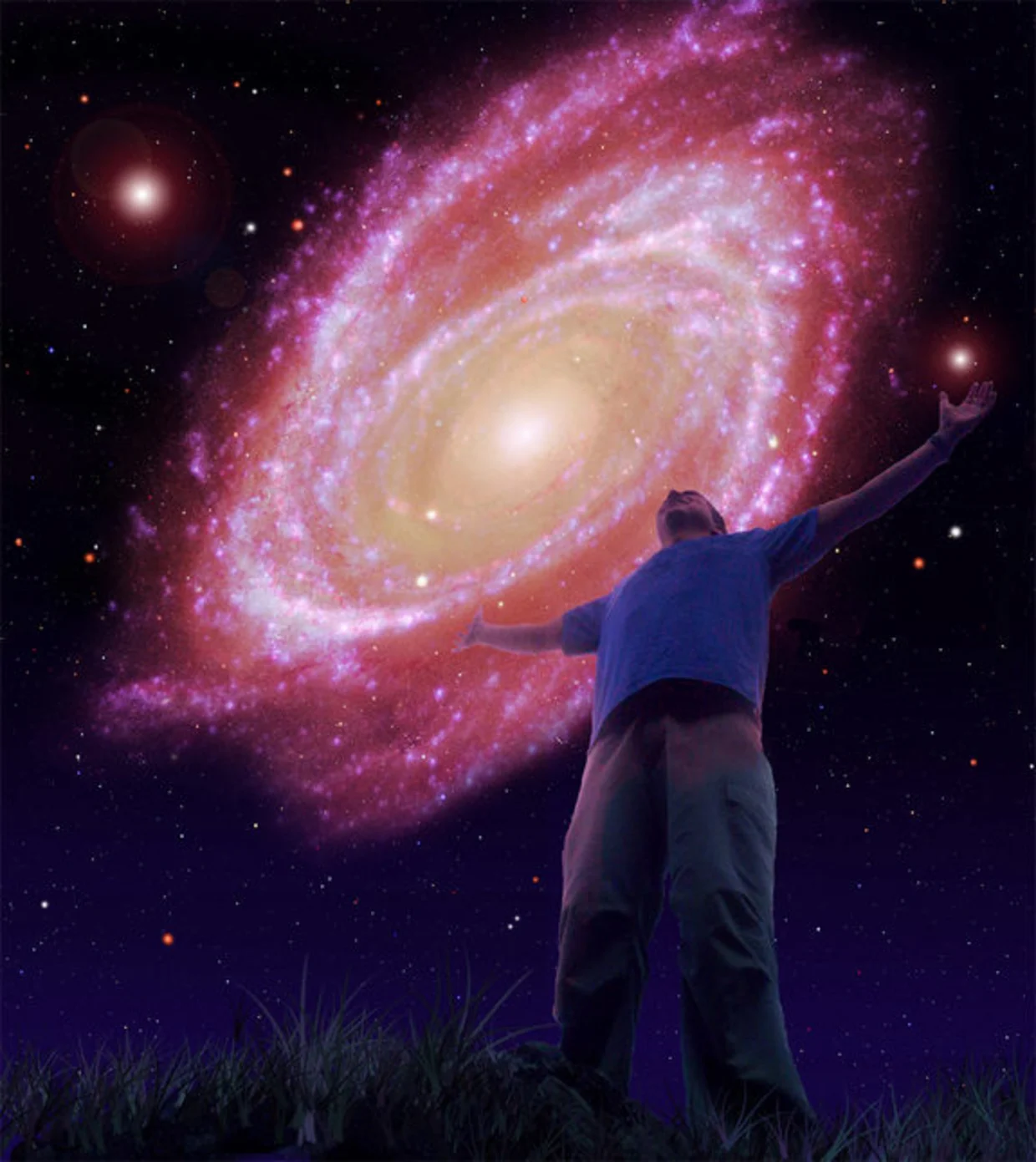
Image, NBC: An artist's conception of the Milkomeda galaxy — a combination of the Milky Way and Andromeda — a trillion years from now.
The scale of the cosmos dwarfs even our grandest dreams and efforts. Our struggles to solve worldly problems, improve society and expand human knowledge seem almost comically quaint when viewed outside our tiny pale blue dot. The vast, uncaring universe continues its purposeless drift, utterly indifferent to humanity's fragile endeavors.
Searching the stars for meaning, we find only a mirror - reality reflects our nature at us, revealing the strange trick of evolution that conjured purpose where none intrinsically exists. The universe is what we make of it, so we strive in vain to fabricate significance for lives that flare so briefly against the everlasting night.
In the end, our efforts return once more to dust. All civilizations like our own, from the mightiest to the most humble, ultimately succumb to the turning wheel of time.
Life proves transient in a cosmos that knows only change and decay, like ripples upon an endless sea that soon flatten and are forgotten.
And yet we continue drifting through the current of eternity, tiny consciousnesses yearning for meaning within an uncaring whole.